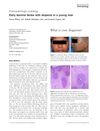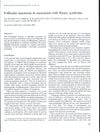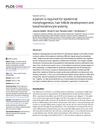36 citations,
July 1996 in “The journal of investigative dermatology/Journal of investigative dermatology” Mice with the 'lanceolate hair' mutation have abnormal hair and skin similar to human Netherton's syndrome.
 August 2020 in “International Journal of Research in Dermatology”
August 2020 in “International Journal of Research in Dermatology” Clouston's syndrome is a rare disorder affecting nails, hair, teeth, and skin, caused by a gene mutation, and currently has no treatment, only supportive care.
1 citations,
January 2013 Glucosylceramides are essential for healthy skin and proper wound healing.
7 citations,
May 2012 in “Journal of veterinary diagnostic investigation” Some young Angus cattle had skin problems due to not enough vitamin A, which got better after they were given more vitamin A.
41 citations,
April 2012 in “The journal of investigative dermatology/Journal of investigative dermatology” Deleting MED1 in skin cells causes hair loss and skin changes.
July 2024 in “International Journal of Molecular Sciences” RF-based therapies might help treat hair loss.
 6 citations,
November 2018 in “Histochemistry and Cell Biology”
6 citations,
November 2018 in “Histochemistry and Cell Biology” Mongolian gerbils heal wounds differently than mice, with unique protein levels and gene expression that affect skin repair.
Controlling Tslp can improve health in AEC syndrome patients.
 June 2024 in “British Journal of Dermatology”
June 2024 in “British Journal of Dermatology” Scalp disease in dermatomyositis causes significant symptoms and has unique features.
 1 citations,
March 2023 in “Frontiers in Cardiovascular Medicine”
1 citations,
March 2023 in “Frontiers in Cardiovascular Medicine” A specific gene variant is linked to heart disease, increased heart muscle, curly hair, and thick skin on palms and soles.
 April 2024 in “Lasers in medical science”
April 2024 in “Lasers in medical science” Near-infrared LED light improves skin rejuvenation and hair growth better than white LED light.
 6 citations,
January 2017 in “Journal of toxicologic pathology”
6 citations,
January 2017 in “Journal of toxicologic pathology” Rabbit skin with active hair growth shows thicker, redder areas due to larger, more numerous hair follicles and increased blood vessels.
 3 citations,
April 2016 in “International Journal of Dermatology”
3 citations,
April 2016 in “International Journal of Dermatology” A young man was diagnosed with trichoepitheliomas, causing thick skin and hair loss.
 19 citations,
February 2008 in “Archives of Dermatological Research”
19 citations,
February 2008 in “Archives of Dermatological Research” Mast cells might contribute to hair loss by causing skin thickening.
 94 citations,
February 1994 in “The journal of investigative dermatology/Journal of investigative dermatology”
94 citations,
February 1994 in “The journal of investigative dermatology/Journal of investigative dermatology” EGF makes hair follicles grow longer but stops hair production.
 November 2024 in “Journal of Cosmetic Dermatology”
November 2024 in “Journal of Cosmetic Dermatology” MSC exosome therapy improved hair quality in patients with acquired trichorrhexis nodosa.
March 2022 in “Veterinary dermatology” A one-year-old cat had multiple benign skin tumors similar to those known in humans.
Excessive vitamin A intake caused severe health issues that mostly resolved after stopping the intake.
 3 citations,
January 1996 in “Pharmacotherapy: The Journal of Human Pharmacology and Drug Therapy”
3 citations,
January 1996 in “Pharmacotherapy: The Journal of Human Pharmacology and Drug Therapy” Zidovudine may cause hair loss in advanced-stage HIV patients.
 April 2023 in “Rossijskij žurnal kožnyh i veneričeskih boleznej”
April 2023 in “Rossijskij žurnal kožnyh i veneričeskih boleznej” The document concludes that four related skin diseases, which often occur together, are caused by blocked hair follicles.
 17 citations,
May 1987 in “Clinical and Experimental Dermatology”
17 citations,
May 1987 in “Clinical and Experimental Dermatology” A patient with Sézary syndrome showed improvement after treatment and the study suggested follicular mucinosis might indicate future lymphoma risk.
26 citations,
December 2019 in “Indian Journal of Dermatology, Venereology and Leprology” PRP combined with minoxidil is the most effective and safe treatment for male pattern baldness.
January 2018 in “Indian Dermatology Online Journal” A child with Olmsted syndrome showed mild improvement in hair and skin issues with treatment.
 1 citations,
January 1997 in “Journal of Investigative Dermatology”
1 citations,
January 1997 in “Journal of Investigative Dermatology” RU58841, an androgen receptor blocker, significantly increased hair density, thickness, and length in monkeys when applied topically daily for several months.
 7 citations,
March 2020 in “PloS one”
7 citations,
March 2020 in “PloS one” α-parvin is necessary for skin and hair growth and for the correct orientation of skin cells.
 45 citations,
October 2008 in “Cytokine & Growth Factor Reviews”
45 citations,
October 2008 in “Cytokine & Growth Factor Reviews” Activins and follistatins, part of the TGFβ family, are crucial for hair follicle development and skin health, affecting growth, repair, and the hair cycle.
 41 citations,
June 2003 in “Journal of The American Academy of Dermatology”
41 citations,
June 2003 in “Journal of The American Academy of Dermatology” Long-term minoxidil use can cause pseudoacromegaly, but stopping it improves symptoms.
September 2024 in “Journal of Ayurveda and Integrative Medicine” Ayurvedic treatments can improve symptoms and quality of life for systemic sclerosis patients.
3 citations,
December 2019 in “Lupus” Hydroxychloroquine effectively treated a woman's lupus skin issues and hair loss.
10 citations,
June 2019 in “Transplant infectious disease” The virus linked to a rare disease was found in a patient's blood and urine before skin symptoms appeared.
















